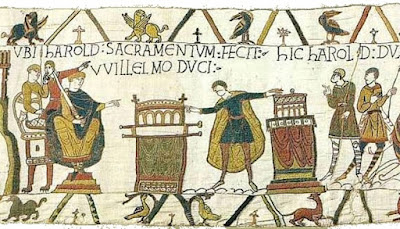[1] I sometimes still teach IELTS Advanced English and one
of the ways, just by listening, that you can tell whether a student has a
(near-) native command of the everyday spoken language is his / her ability to
use one of the smallest words in the English language: get. If you (dare
to) look at the verb ‘get’ in Wiktionary, you will find thirty-three
definitions of that single word. Moreover, get is used in phrasal verbs,
for example get on, get off, get out, get away etc.
The number of meanings really is countless, but here is one example:
get on
[i] He got on a bus; a physical action that you
picture in your mind of movement from one place onto another
[ii] He got on my nerves; you can see the
connection with [i] although, this time, it has become figurative.
Similarly: “How did we get on to that topic?”
[iii] But what about these ones …
Get on [continue] with your work!
How did you get on [cope] in that exam?
We don’t really get on [have a good relationship].
It was getting on for [approaching] midnight.
And there are others!
You can see a ‘shift’ from [i] a clear, physical idea to
[ii] a figurative idea and to [iii] figurative ideas that have little, if any,
obvious connection with the original physical sense.
This feature is evident in compounds of ferō although
by no means as intimidating,
[2] Ferō is a very good example of why you should
tread carefully with Latin dictionaries which can either be overly simplistic,
providing a few superficial and unexplained meanings, or utterly intimidating: efferō,
for example, may offer a choice of twelve different translations! Do not
approach your study of Latin by heavy reliance on dictionaries or trying to
learn too much too quickly. Focus on a few key meanings which
illustrate how the verbs can refer to [1] physical movement and, often far more
commonly, [2] abstract ideas. When others occur as you read, you should take
note of them, and well annotated Latin texts will always give a precise
translation in context. Simply be aware that various translations are possible
and do not always opt for the first translation that comes to mind.
[3] Here are the same verbs shown above, but this time, further meanings are added to illustrate some of the abstract concepts that the verbs can convey; this is by no means exhaustive, and the aim is simply to make you aware that several translations of one verb are possible.
adferō; afferō: bring / carry something to a place│bring information; report; announce
auferō: take away│snatch; steal; mislead
circumferō: bring / carry around│divulge; publicise
cōnferō: bring / carry together; collect│discuss; confer
efferō: bring / carry out│raise; elevate; extol
īnferō: bring / carry in│cause; inflict [with bellum: wage / start war]
offerō: bring before│present; offer; show; exhibit
praeferō: bring / carry in front│display; prefer
trānsferō: bring / carry across│transfer; translate
[4] An important point to note: English has many derivatives
from these compound verbs, but the difference is that, while the English
derivative generally has a single, clear meaning, the Latin verbs from which
they are derived can have multiple meanings, for example:
The judges need to confer to decide the winner.
What do you infer by that?
They offered me a refund.
Could you please translate this for me?
The examples from the authors, none of which express a literal
action, show some of the meanings the Latin verbs can convey:
[i]
proptereā pāce adveniō et pācem ad vōs afferō
(Plautus) │ Therefore, in peace am I come to you, and peace do I bring.
in ea adferam enim super eōs mala (Vulgate) │ for I
will bring evil on them
grātōs tibi optātōsque esse quī dē mē rūmōrēs adferuntur
nōn dubitō mī dulcissimē Tīrō, (Cicero) │ I am sure, dearest Tiro, that the
reports about me which reach you (are reported about me) ¦ answer
your best wishes and hopes [ = are pleasing to you and hoped for].
[ii]
auferimur cultū; gemmīs aurōque teguntur (Ovid) │ We’re
carried away (deceived, duped) by adornment; all things are
hidden in gold and gems
[iii]
interim nōlō sē iuvenēs satis īnstrūctōs, sī quem ex hīs,
quī brevēs plērumque circumferuntur (Quintilian) │ For the present I
will only say that I do not want young men to think their education complete
when they have mastered one of the small text-books of which so many are in
circulation [ = are being carried around]
[iv]
cōram inter nōs cōnferēmus (Cicero) │ we will
discuss it when we meet [literally: face to face between us]
[v]
cum tē summīs laudibus ad caelum extulērunt (Cicero)
│ they praised you with the highest honors to the heavens [ = they
raised you / extolled you to heaven]
Cn. Lūcullus, familiāris noster, mātrem efferēbat.
(Cic.) │ Our friend Cn. Lucullus was burying his mother. [ = carrying
her out (of the house for burial)
[vi]
quae pars cīvitātis Helvētiae īnsignem calamitātem populō
Rōmānō intulerat (Caesar) │ this part of the Helvetian state had
inflicted a great calamity upon the Roman people
[vii]
vae illī, nīl iam mihi novī offerre potest (Plautus)
│ Woe be unto him! Nothing new can now
be inflicted upon me [= he can bring nothing new before me]
[viii] prae¦ferō: prefer i.e. to bring someone /
something before someone / something else
Frūstrā mē pāstor ille … [ob eximiam speciem] tantīs
praetulit deābus. (Apuleius)│ So it meant nothing when that
shepherd … preferred me [for my surpassing beauty] to such mighty
goddesses.
[ix]
Itaque cōnstituunt illīs locīs excēdere et in Celtibēriam
bellum trānsferre (Caesar) │ They therefore resolve(d) to quit their
posts, and to transfer the war to Celtiberia.








































